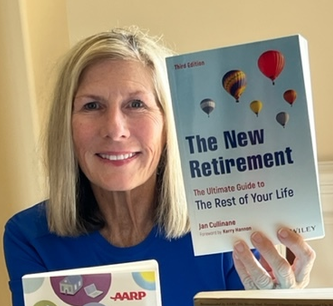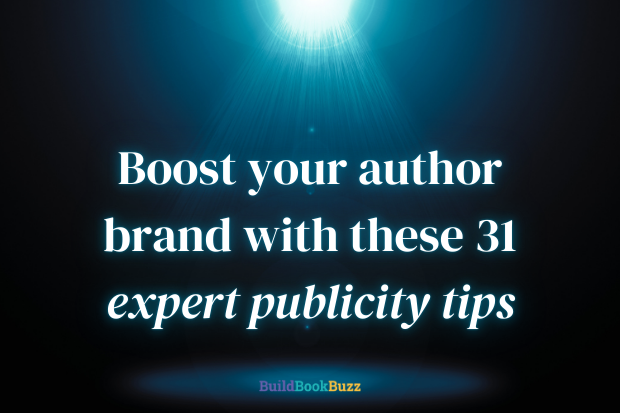Boost your author brand with these 31 expert publicity tips
Get more media exposure for yourself and your book by using these expert publicity tips from publicists, marketers, and entrepreneurs.
One of the easiest ways to get publicity is to subscribe to the free services that help journalists find sources to interview for articles, news reports, podcasts, and blog posts.
Journalists submit a “query” – a description of what they’re looking for – and appropriate sources who subscribe to the services respond with the information requested.
For this roundup article, I used one of the newest of these services, Source of Sources, to ask publicists, entrepreneurs, and others to share their best tips for getting news media attention – publicity.
Their responses are spot-on. (I’m a national award-winning former publicist and the author of two traditionally published publicity books, so this is a topic I know well.)
Here’s what they told me. Use their expert publicity tips to get more visibility for you and your books.
Link your book to current events (“newsjacking”)

“Use timely news hooks to get media attention. Tie your product to current events or trending topics relevant to your industry. This creates a sense of urgency and makes your pitch more appealing to journalists looking for fresh, timely stories.”
Casey Meraz, CEO, Juris Digital

“I want to pitch my book as it relates to the Democratic National Convention and/or students heading to college in the fall. Since my book focuses on ways to calm the mind and body, the pitch will focus on how we can collectively harness our senses and create habits to combat the stressors we know are coming our way in the coming weeks and months.”
Megy Karydes, Author of 50 Ways to More Calm, Less Stress: Scientifically Proven Ways to Relieve Anxiety and Boost Your Mental Health Using Your Five Senses

“Start by searching for breaking news in your area of expertise, using Google Alerts to see what’s breaking right now. Then identify the problem or issue, and write a brief blog post describing what you’d say to a media interviewer about the breaking news. Pitch yourself as a subject-matter expert to media decision-makers, positioning yourself [by sharing a link to the post] as being able to explain this to the media booker’s target audience.”
Ned Barnett, Founder, Barnett Marketing Communications

“Identify the connective tissue that links your story to what’s in the news right now, so that you are helping reporters bring a new angle to what they must report on anyway. When you help reporters with their homework, they are happy to hear from you.”
Daniel Delson, Head of Media Relations, Magnitude, Inc.
See yourself as an expert and authority

“Don’t forget to focus on yourself as an expert and authority in your industry, as well as on your book. Journalists are always looking to quote fresh faces and support solopreneurs and small business owners in their articles, as that’s who their audience wants to hear from. Focus on the media outlets that create content for the same audience as you as you’ll soon notice an increase in website traffic, social media followers and sales enquiries.”
Laura Perkes, Founder, PR with Perkes

“One of the best avenues for non-fiction authors is to look at themselves as a subject matter expert first and as an author second. What expertise can you share that will be of interest to both a journalist and their audience? How does it relate to current events or bigger topics? The goal is to educate and if the information is surprising, interesting or unique, you’re in better position to drive potential audiences to want to learn more through your book.
“For fiction authors, consider your personal story. Why was the book written? What may be unique or interesting in your own life? How might the book tie-in to bigger events of the day?”
Ryan Gerding, President and COO, INK Inc. Public Relations
Target the right media outlets

“Target niche media outlets that directly serve your audience’s interests. They’re often more open to unique stories and can provide more meaningful coverage. A tailored pitch that resonates with their specific focus will stand out and increase your chances of getting noticed.”
Andrew Grella, CEO, Formen Makeup

“Before you send any pitches to media, research the right journalists and tailor your pitch based on what they cover and what kinds of story they typically write. For example, don’t pitch a feature idea to a journalist who only writes roundups. Do your research up front and it will pay off.”
Haley Adams Raymond, Freelance PR Strategist

“Getting media attention for your product is the result of executing the three ts – sending the right topic (your product) at the right time (when your product offers new value to consumers) from someone with the right title (your company) to the right outlets (those whose audiences care about your product). Don’t send your product news to outlets that don’t have relevant audiences. It won’t work, and you’ll waste your time.”
Dustin Siggins, Founder, Proven Media Solutions

“Find a radio station or TV station that has an audience that would like your book, and contact them and offer yourself as a guest. When my first book was published, The New Retirement: The Ultimate Guide to the Rest of Your Life, I did cold-calls to radio and TV stations and asked to be on their shows.
“I was able to find ‘Boomer’ oriented radio shows looking for guests, and I also appeared on the Tyra Banks show and was on ‘Fox and Friends’ twice. It helped that I have an unusual habit – I can speak backwards fluently. Radio hosts and Tyra’s producers were interested in my strange ability, and I was able to talk about my book, too.”
Jan Cullinane, Retirement Speaker, Author, and Consultant

“Before you send out any pitches, know your audience and know the media they consume. If you make organic cat food, don’t send your press release, and offer of samples to Dog Magazine! I know that sounds simple and daft but as someone who has worked in the world of PR for nearly 30 years, I see rookie mistakes over and over again and It doesn’t have to be that way.
“Yes, I know you want to get into the press, and you want your products and services to be seen by more people, but you need to put in the work and understand what your people read, watch, and listen to and then research those outlets.
“Read The New York Times, watch CNN, and listen to the podcasts and once you are confident there is a match, find the contacts and pitch.”
Natalie Trice, Fractional Head of PR and Communications, Natalie Trice Publicity
Pitch with statistics or something counterintuitive

“Use research to grab attention: Beyond having an intriguing topic and a compelling point of view, proprietary research is critical to capture interest from media – and validate an author’s messaging. If an author’s research produces counterintuitive findings, that’s all the better.
“When publicizing The 4 Factors of Trust, sharing proprietary research from the book opened many doors for the authors to be interviewed by and contribute bylined articles to high-impact business news organizations and podcasts.”
Veronica Zanellato Kido, Publicist, Kido Communications, LLC

“The most powerful way is to leverage timely, data-driven insights that somehow challenge conventional wisdom. Journalists love fresh takes and surprising stats.
“Conducting original research or digging through existing data in new ways will turn up compelling narratives that resonate with the media, setting your product as a solution to newly revealed problems or trends.”
Kevin Shahnazari, Founder and CEO, FinlyWealth
Think in headlines

“When brainstorming product pitches, thinking in headlines will not only get you to dive deeper into why this product is relevant and timely, but will also force you to examine whether this really aligns with the reporter to whom you are pitching.”
Jian Huang, Principal and Co-Founder, pH Collective

Link to a cause, nonprofit, or community event
“Aligning your product with a meaningful cause can grab the attention of news media. When your company supports or collaborates with a cause that resonates with the public, it tells a story that’s newsworthy and impactful. This authentic engagement can turn heads and make headlines.”
Will Yang, Head of Growth and Marketing, Instrumentl

“Combine services with community-driven art. In one instance, we partnered with local artists to put up a mural at a repair site, targeting headlines in both artwork and our services. This unusual mix of fixing and art not only captured the headlines but also brought out the spirit of communal involvement and innovation that defined our narrative.”
Kyle Leman, Business Growth Expert, Founder, Crossroads Foundation Repair
Think like a journalist

“After spending more than a decade in newsrooms, I know that editors and journalists are not looking to do you or your company any favors. They are looking to achieve their own objectives, so when you’re pitching them, think first of what will help them the most and how you can connect that to your objectives.
“Keep the pitch brief and easy to understand, but include additional information after your signature (that you can refer to in the body of the email).”
Eric Schultz, Co-founder, World’s Fair Communications

“It’s very important for authors, or anyone seeking publicity, to think like a journalist. So we need to distance ourselves a bit from the work and our personal connection to it and try to ‘sell’ the bigger story that will be of interest to a larger audience and serve a journalist’s needs.”
Ryan Gerding, President and COO, INK Inc. Public Relations
Include a human interest element

“Leverage a compelling human-interest story. Journalists and editors are always on the lookout for stories that resonate emotionally with their audience. By showcasing how your product has positively impacted someone’s life or solved a real-world problem, you create a narrative that not only attracts media interest but also builds a deeper connection with your audience.”
Burak Ozdemir, Founder, Morse Decoder

“Pitch a story that highlights a compelling human interest angle. Focus on an individual whose life significantly improved because of your product. Journalists love narratives that engage readers emotionally and show real-world impact.”
Andy Gillin, Attorney and Managing Partner, GJEL Accident Attorneys
Be a reliable resource

“Show up as a resource to journalists. Meet their deadlines, support their work, and go above and beyond to get them the information they need for the story.”
Jordanne Pallesen, Owner, Julep Publicity
React to negative news

“The news media tends to focus more on negative stories. You can leverage this tendency to gain publicity to your advantage. For example, you can position your company as the solution to a widespread problem highlighted in negative news stories.”
Harrison Tang, CEO, Spokeo
Pitch with the right tools

“Use media alerts and tip sheets to grab news outlets’ attention. These quick, informative releases highlight the most newsworthy aspects of your product, making it easy for journalists to cover your story. Send them out ahead of major events or product launches to maximize impact.”
Andrei Newman, Founder, Designer Home Spas
Leverage seasons, holidays, and occasions

“One of my favourite creations was a news release promoting a license-free weekend of winter ice-fishing, which happened to line up with Valentine’s Day, titled ‘Love on the Ice.’ Beyond being fun to write, we spent lots of time blending the usual need for a cabinet minister’s quote with humour and creating a picture of the romantic experience.
“While intended for a small provincial audience, this release went across the country and landed on the national news broadcast.”
Tim Conrad, President, Butterfly Effect Communications Inc.

“Play off seasonal trends to create timely stories worth sharing. For example, we capitalized on Earth Month by offering eco-friendly gardening tips, aligning our area of expertise with a larger, timely narrative.”
Samuel Davis, CEO, London Gardeners
(Editor’s note: Get a list of quirky August holidays and occasions plus ideas for using them to call attention to your book here.)
Just ask for it

“Ask for the coverage. I spent nearly 20 years in television. If a business owner or entrepreneur was bold enough to ask (pitch) me for a story and we could craft one with solid viewer benefit, then I was all in.”
Michelle Rupp, Owner, Memorable Results Media
Play up any and all local angles

“Show how your product is produced either locally or nationally, as the media always likes a made-in-America story or one about a company creating jobs locally.”
David Johnson, CEO, Strategic Vision PR Group
Create an event

“Events are excellent drivers for media coverage from print, digital, and importantly, broadcast. Readings, signings, speaking engagements, etc. open the door to multiple opportunities for media.
“While bookstores can be great location partners, also consider libraries, community and faith centers, restaurants and cafes, and other like-minded retailers.”
Deborah Brosseau, Owner, Deborah Brosseau Communications
Include all necessary details

“To make your product shine in pitches to journalists, ensure you include all the details. Share hyperlinks to your product on Amazon and your website, and mention the price.
“Provide a link to a high-res image on Dropbox or Google Drive and embed a low-res image in the email to catch their eye right away. Remember, no attachments.”
Amy Bartko, Founder, Chatterbox PR & Marketing
Focus on audience benefits

“The media is confronted with numerous pitches on new products and services. The way to make your product stand out and get media coverage is to show how it is a solution to a problem that journalists have written about. You want to provide the problem, why this is a problem, and how your product provides the solution.”
David Johnson, CEO, Strategic Vision PR Group

“Viewer benefit is huge for me. As I stress with my clients, we do not ask for a free commercial. We are teaching, demonstrating, or educating viewers. Then we have a story worthy of asking for coverage.”
Michelle Rupp, Owner, Memorable Results Media
More publicity tips and tools
You’ll find lots of other publicity tips on this site, too. Here are a few to get you started. Using the search box for “publicity,” “media,” and “pitch” will help you uncover more.
- 4 book publicity facts that will help you succeed
- Tip sheets: How to create the best book publicity document you’ll ever need
- Sell more books in your backyard with these local book publicity tips
- Trade journals: The book publicist’s secret weapon
Get help snagging priceless media attention with “PitchPro: Your Expert Response Toolkit,” my new collection of downloadable cheat sheets, worksheets, and templates you can use to discover who and what reporters and others are looking for … and give them what they need so you have a shot at being quoted.
Get all the details and discover how PitchPro will help you generate the kind of media attention that sells books and builds author careers here.
Have you gotten news media attention? How did you make it happen? Please tell us in a comment!
Like what you’re reading? Get it delivered to your inbox every week by subscribing to the free Build Book Buzz newsletter. You’ll also get my free “Top 5 Free Book Promotion Resources” cheat sheet immediately!

